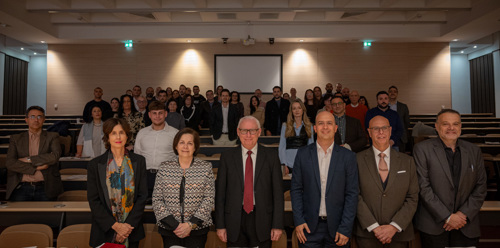Ombudsman delivers concluding remarks at Policy, Politics and Governance Research Symposium
Published December 02, 2024

The Parliamentary Ombudsman, Judge Emeritus Joseph Zammit McKeon, delivered the concluding reflections at a Research Symposium organised by the Department of Policy, Politics and Governance within the Faculty of Economics, Management and Accountancy (FEMA).
The event showcased diverse research projects undertaken by students, addressing critical issues in governance, policy-making, and public administration.
In his welcome address, Professor Mario Thomas Vassallo, Head of the Department, highlighted the department's commitment to fostering interdisciplinary collaboration among undergraduate and postgraduate students, leading to innovative approaches to complex policy challenges.
Prof. Vassallo also announced an upcoming collaboration: the launch of an M.A. in Ombudsman Law and Governance. This postgraduate degree programme, developed jointly with the Faculty of Laws and the Office of the Ombudsman, is scheduled to commence in the 2025/26 academic year.
Prof. Emanuel Said, Dean of the Faculty of Economics, Management and Accountancy and the Rector’s Delegate to the Institute for Public Services, also addressed the symposium. He spoke about "FEMA: A Faculty on the Move," highlighting the faculty's ongoing initiatives to advance education and research. Prof. Said emphasised FEMA's commitment to developing leaders out of ordinary people, underscoring the faculty's role in shaping future policymakers and public administrators.
The symposium featured presentations on a wide range of pertinent topics. Lorraine Abela Vassallo examined "The Budgeting Process within Maltese Government Entities: Autonomy vs Control," assessing how central government oversight impacts the autonomy of Extra Budgetary Units. Her study revealed that while central control is essential for accountability and transparency, a balance is necessary to ensure operational efficiency.
A discussion panel moderated by Dr Marguerite Camilleri included insights from researchers on public management issues. Lily Abela presented her work on "Solar Entitlements for Owners of Photovoltaic Systems in Malta," highlighting the urgent need for a dedicated solar rights policy to advance sustainable energy adoption.
Stephen Bonanno evaluated "Body-Worn Cameras and Their Impact on Policing," discussing how this technology enhances accountability but raises privacy concerns that must be carefully managed. Carl Muscat explored "The Use of AI as an HR Toolkit within the Maltese Public Service," recommending policy reforms to address security, training, and data management in implementing artificial intelligence.
Further contributions included Ġorġ Vella's analysis of "The Rave as a Protest Towards the State," which explored how Maltese rave communities influence public policy through coalition-building or acts of dissent.
Glen Falzon discussed "Malta’s Low Fertility Rate: The Implications for the Political Economy," emphasising the need for comprehensive policies that integrate economic, social, and cultural interventions to address demographic challenges.
In his concluding reflections, the Parliamentary Ombudsman commended the students and academics of the Department of Policy, Politics and Governance for their invaluable contributions in promoting transparency and accountability in society. He emphasised that policymakers and public administrators should be guided by the right to good administration principles, which are pivotal for a more open and informed society.
The Ombudsman stressed the importance of continuously monitoring public funds, enhancing knowledge and training, strengthening internal controls and audit mechanisms, and fostering good governance and integrity. He highlighted that academic training and specialisation in the public sector are crucial for delivering professional services to the people and for preventing maladministration.
Expressing his satisfaction with the quality of the students' research, the Ombudsman encouraged continued collaboration between academic institutions and public bodies. Such partnerships, he noted, are instrumental in nurturing informed professionals who will contribute positively to Malta's governance and public administration.